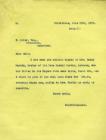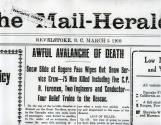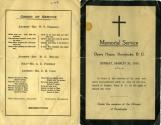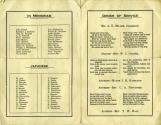1
Danger in the Mountains: Part 2The winter of 1909 to 1910 was especially severe throughout the northwestern United States and western Canada. The extremely heavy snowfall throughout the whole area triggered avalanches, which resulted in the loss of hundreds of lives. In Rogers Pass, it snowed more than seven feet in nine days and the wind howled continuously.
2
The Mail-Herald of January 14 1911 reported: "On March 4, 1910, the Pacific Express was held at Rogers Pass station, and the Atlantic Express at Glacier, because a slide had come down near the summit of the pass, covering 600 feet of track. Roadmaster John Anderson had 63 men, a rotary plough, and locomotive 1751 at work clearing the track. At duck he went to the watchman's shack near snow shed #17 to phone Chief Dispatcher Charlie Cotterell in Revelstoke that the track would be cleared in another two hours. He had not gone far on the way back when he realized that things did not look right. He could not see the beam of the headlight, nor the glow from the engine firebox reflected on the snow. At once he knew what had happened. A second slide had come down - this one from the other side of the narrow valley - and covered everything in its path! As he got closer, Anderson thought he heard a faint cry above the howling of the wind. Following the sound he found the locomotive fireman Bill LeChance, who had been sucked out of the engine cab and tossed 50 feet away, sustaining two broken legs. Anderson dug him out and made him as comfortable as possible under the circumstances, then went back to the watchman's shack to phone Revelstoke and tell them what had happened. While waiting for help to arrive, he did what he could by himself. D. McRae, a bridge carpenter, was blown to the roof of #17 shed, but survived. A Chinese cook had a miraculous escape when the cars of the work train were overturned. Two linemen were some distance from the path of the slide and escaped. Conductor R.J. Buckle was rescued, but died of severe burns."4
Heading from Mail Herald article regarding the avalanche at Rogers Pass, March 4, 1910.5
Crew clearing avalanche at Rogers Pass.4 March 1910
Rogers Pass, Selkirk Mountains, British Columbia, Canada
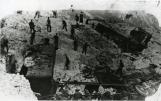
6
Crew clearing avalanche at Rogers Pass, March 4, 1910.7
Of the 58 men killed in the slide, 32 were Japanese labourers. A Memorial Service held in the community listed the Japanese men separately. The Japanese men had all been hired as labourers by the Nippon Supply Company, and that firm was responsible for sending the bodies of the deceased men back to Japan.9
Front and back page of Memorial card for those killed in the March 4,1910 slide at Rogers Pass.11
Inside of Memorial card for the March 4, 1910 snowslide at Rogers Pass.12
The local superintendent, Thomas Kilpatrick, sent personal letters to families of many of the men who were killed. Wages owing to the men and any personal effects were sent to the next of kin. The company was not shown to be negligent or criminally responsible for the deaths of the men and they were not required to pay compensation, but in some cases of family hardship, the company did make some payments to families.13
C.P.R. correspondence regarding one of the men killed in the avalanche.15 June 1910
Revelstoke, British Columbia, Canada
